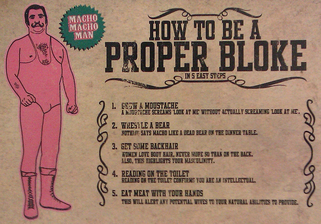
Now, I will be clear. I am 100 per cent with my editor on this – if people want to meet up and talk about things that bother them, that is fine. Creating ways of supporting one another, safe spaces and places to talk about problems are all good things, and I’m happy to see men doing them.
The article recognises the links to feminism (and the writer says he has many of the same goals) but is unconvinced by them:“The old refrain "patriarchy hurts men too" is undoubtedly true but it is not a solution” Well, no. It’s a statement about the problem. In the same way that saying that walking over broken glass hurts the feet of everyone who isn’t wearing thick boots is not a solution to the problem of there being broken glass on the floor, just a statement.
| “It implies that all we need to do is achieve full social justice for women and male-specific problems will simply wither away.” Again, I don’t see this as being true unless you’re talking about feminism that wants to keep the status quo pretty much as is, but with a few more women occupying positions traditionally reserved only for men. Now, I’m not entirely sure what Fogg means here by “full social justice” but I don’t think that’s possible – for either sex – if we keep most things as they are. Better to sweep up the broken glass than to just give a few more people boots. | I’m just slightly uncomfortable with the idea that any men’s movement has to define itself against feminism. |
I wasn’t at the conference, but it seems to me that any attempt to answer those questions just by looking at sex and gender is doomed to fail. These are things that are going to tie into class, disability and race just as much as gender, often entwined with other issues. And failing to use the larger lens to look at these problems is going to mean a narrow focus that doesn’t see the context.
Squeamish Louise



 RSS Feed
RSS Feed
